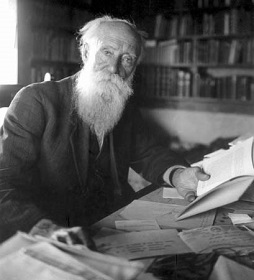De Amerikaanse dichter, essayist en natuuronderzoeker John Burroughs werd geboren op 3 april 1837 op een farm in de Catskill Mountains nabij Roxbury, Delaware County, New York als het zevende kind in een rij van tien. Hij vertrok op de leeftijd van 17 omdat zijn vader niets wilde weten van Johns wens om door te leren. Hij moet zijn eigen studies in New York financieren. Gedurende die tijd las hij de werken van William Wordsworth en Ralph Waldo Emerson, die een blijvende invloed op hem hadden. In 1856 verliet hij het Cooperstown Seminar; een jaar later trouwde hij met Ursula North (1836-1917). Hij bereikte zijn eerste literaire succes in 1860 met een essay in het Atlantic Monthly Magazine, uitgegeven door James Russell Lowell. Tijdens de Amerikaanse Burgeroorlog (1861-65) nam hij in Washington, D.C. een functie aan als secretaris van het United States Department of the Treasury; later werd hij de auditor voor de Federale Bank. Tegelijkertijd begon hij met het schrijven van essays over natuurlijke geschiedenis. Gedurende deze tijd ontmoette hij Walt Whitman, wat resulteerde in een langdurige vriendschap. De bekende dichter moedigde hem schriftelijk aan. Omdat essays van Burrough enthousiaste lezers vonden, waagde hij zich al snel aan boeken. In 1874 kochtt hij een boerderij in Westpark, New York en hield hij zich bezig met het telen van fruit. Hij bleef natuurhistorische boeken en essays schrijven die hem ronduit populair maakten. In 1895 bouwde hij een blokhut met zijn zoon Julian, die ze Slabsides doopten. Daar ontving hij talloze beroemdheden midden in de natuur. In 1911 koos hij een gerenoveerde boerderij in de buurt van zijn geboorteplaats als zomerresidentie. Hier bij Woodchuck Lodge schreef de natuurfilosoof zijn bestsellers. Tijdens zijn leven verkocht hij meer dan 1,5 miljoen exemplaren van zijn werken. In 1901 ontmoette hij zijn bewonderaarster Clara Barrus. De arts werd de grote liefde van zijn leven en uiteindelijk de verzorgster van zijn nalatenschap.
Bluebird
A wistful note from out the sky,
‘Pure, pure, pure,’ in plaintive tone,
As if the wand’rer were alone,
And hardly knew to sing or cry.
But now a flash of eager wing,
Flitting, twinkling by the wall,
And pleadings sweet and am’rous call,-
Ah, now I know his heart doth sing!
O bluebird, welcome back again,
Thy azure coat and ruddy vest
Are hues that April loveth best,-
Warm skies above the furrowed plain.
The farm boy hears thy tender voice,
And visions come of crystal days,
With sugar-camps in maple ways,
And scenes that make his heart rejoice.
The lucid smoke drifts on the breeze,
The steaming pans are mantling white,
And thy blue wing’s a joyous sight,
Among the brown and leafless trees.
Now loosened currents glance and run,
And buckets shine on sturdy boles,
The forest folk peep from their holes,
And work is play from sun to sun.
The downy beats his sounding limb,
The nuthatch pipes his nasal call,
And Robin perched on tree-top tall
Heavenward lifts his evening hymn.
Now go and bring thy homesick bride,
Persuade her here is just the place
To build a home and found a race
In Downy’s cell, my lodge beside.
The Partridge
List the booming from afar,
Soft as hum of roving bee,
Vague as when on distant bar
Fall the cataracts of the sea.
Yet again, a sound astray,
Was it the humming of the mill?
Was it cannon leagues away?
Or dynamite beyond the hill?
‘T is the grouse with kindled soul,
Wistful of his mate and nest,
Sounding forth his vernal roll
On his love-enkindled breast.
List his fervid morning drum,
List his summons soft and deep,
Calling Spice-bush till she come,
Waking Bloodroot from her sleep.
Ah! ruffled drummer, let thy wing
Beat a march the days will heed,
Wake and spur the tardy spring,
Till minstrel voices jocund ring,
And spring is spring in very deed.

